Related Research Articles
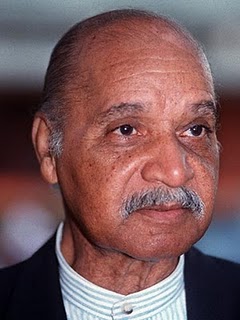
José Craveirinha was a Mozambican journalist, story writer and poet, who is today considered the greatest poet of Mozambique. His poems, written in Portuguese, address such issues as racism and the Portuguese colonial domination of Mozambique. A supporter of the anti-Portuguese group FRELIMO during the colonial wars, he was imprisoned in the 1960s. He was one of the African pioneers of the Négritude movement, and published six books of poetry between 1964 and 1997. Craveirinha also wrote under the pseudonyms Mário Vieira, José Cravo, Jesuíno Cravo, J. Cravo, J.C., Abílio Cossa, and José G. Vetrinha.

Cinema of Africa covers both the history and present of the making or screening of films on the African continent, and also refers to the persons involved in this form of audiovisual culture. It dates back to the early 20th century, when film reels were the primary cinematic technology in use. As there are more than 50 countries with audiovisual traditions, there is no one single 'African cinema'. Both historically and culturally, there are major regional differences between North African and sub-Saharan cinemas, and between the cinemas of different countries.
Kuxa Kanema: The Birth of Cinema is a 2003 documentary by Margarida Cardoso on the National Institute of Cinema (INC), created by President Samora Machel following the 1975 independence of Mozambique.
Ricardo Achiles Rangel was a Mozambican photojournalist and photographer.
Disobedience is a 2003 drama film directed by Licínio Azevedo.
The Great Bazaar is a 2006 drama film written and directed by Licínio Azevedo. It is the story of two boys who meet in an African market.
The Water War is a documentary movie about the Water conflict in Mozambique. It is directed by Licínio Azevedo.
Night Lodgers is a 2007 documentary directed by Licínio Azevedo about squatters living in the former Grande Hotel Beira in Mozambique.
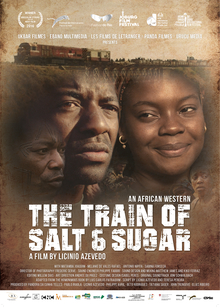
The Train of Salt and Sugar is a 2016 internationally co-produced adventure film written and directed by Licínio Azevedo. It was selected as the Mozambican entry for the Best Foreign Language Film at the 90th Academy Awards, but it was not nominated.
Edouard Sailly is a pioneering Chadian film director, "the first filmmaker in Chad".
Isabel Helena Vieira Cordato de Noronha is a film director from Mozambique.
Fátima Albuquerque is a journalist and documentary filmmaker from Mozambique. She was one of the first Mozambican women to direct films in the 1980s. Her documentaries demonstrate the broad range of documentary filmmaking in Mozambique.
The Cinema of Benin refers to the film industry of the Republic of Benin in West Africa.
The Central African Republic is one of the world's poorest countries and the film industry is correspondingly small. The first film made in CAR appears to have been Les enfants de la danse, a short French-made ethnographic documentary of 1945. Joseph Akouissone was the first Central African to make a film in the country, with his 1981 documentary Un homme est un homme; he was followed by the documentaries made in the 1980s by Léonie Yangba Zowe. Since then a series of ongoing conflicts and economic crises have severely limited the potential growth of film-making in the country. The first feature-length drama made in the country was Le silence de la forêt, a 2003 CAR-Gabon-Cameroon co-production about the Biaka people.
O Tempo dos Leopardos is a 1985 war drama. It is a Yugoslav-Mozambican co-production directed by Zdravko Velimirović. O Tempo dos Leopardos was the first Mozambican feature film.
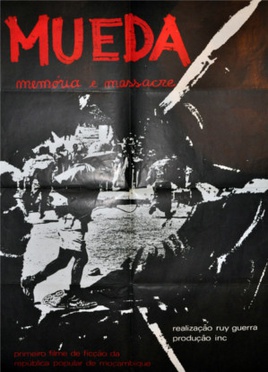
Mueda, Memória e Massacre is a 1979 Mozambican film directed by Ruy Guerra and considered the country's first feature fiction film. The film captures the annual theatrical re-enactment of the Mueda Massacre of 1960 that left over 600 peaceful protesters dead.
Lara Sousa, also Lara de Sousa, is a Mozambican filmmaker. She worked as a programmer of the DOCKANEMA Documentary Festival of Mozambique for several years and had been engaged in social and development projects, focusing her research on gender issues, human rights and others.
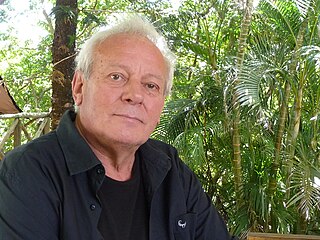
Licínio Silveira Azevedo is a Brazilian–Mozambican journalist, film producer, screenwriter, and film director of award-winning documentaries and feature films.
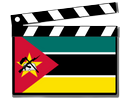
The cinema of Mozambique refers to the films and the film industry of Mozambique, which creates films in Portuguese. Furthermore, some foreign films have been produced about Mozambique or were shot there, such as Sidney Pollack's 2005 The Interpreter, Edward Zwick's 2006 Blood Diamond, and Teresa Prata's 2007 Sleepwalking Land, an adaptation of the novel by Mozambican author Mia Couto.

Sol de Carvalho is a Mozambican film director and producer.
References
- ↑ Roy Armes, 'Mozambique', in Dictionary of African Filmmakers (Bloomington: Indiana University Press, 2008), pp. 225–26 ISBN 9780253351166.
- ↑ Unless otherwise stated, information in this section is drawn from 'Camilo de Sousa', CinAfrica.
- ↑ Isabel Noronha, Max Annas and Hentriette Gunkel, ‘Cinema of Resistance’, in Gaze Regimes: Film and Feminisms in Africa, ed. by Jyoti Mistry and Antje Schuhmann (Wits University Press, 2015), pp. 148–60 (pp. 149–51).
- ↑ Lists in this section are based on 'Camilo de Sousa', CinAfrica; and 'De Sousa, Camilo (alias Abranches de Sousa, Camilo)', in Les cinémas d'Afrique: dictionnaire (Paris: Editions Karthala, 2000), pp. 147–48 ISBN 2845860609.
- ↑ Keith Shiri, Directory of African film-makers and films (Greenwood Press, 1992), p. 171.
- ↑ Les cinémas d'Afrique: dictionnaire (Paris: Editions Karthala, 2000), p. 147 ISBN 2845860609.